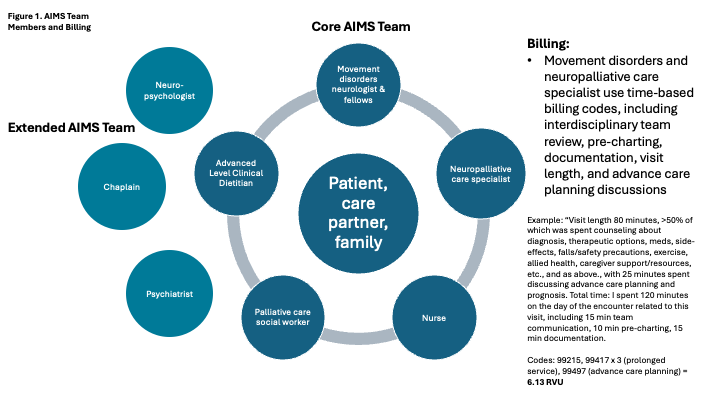Category: Palliative Care
Objective: To describe and evaluate the Advanced Interdisciplinary Movement Disorders Supportive Care (AIMS) Clinic, a novel interdisciplinary clinic for patients with advanced movement disorders.
Background: Patients with advanced or late-stage movement disorders face increasingly complex challenges and needs due to the progression of their disease, including diminished quality of life, increased caregiver support, social isolation, and need for advanced care planning [1,2,3,4]. The weekly AIMS clinic was established in 2019 at a tertiary academic center to address these challenges through an interdisciplinary neuropalliative approach. A movement disorders neurologist and fellow, neuropalliative care specialist, certified advanced palliative hospice social worker, gerontological dietitian, and nurse see each patient and their family synchronously, with longitudinal follow-up extending to hospice care coordination, if applicable. Extended team members include a psychiatrist, neuropsychologist, and chaplain who are available to see the patients asynchronously if needed.
Method: We will describe the AIMS clinic workflow, structure, and services offered from its inception in 2019 to December 2023 (Figure 1). Through retrospective chart review, we will collect descriptive statistics on patient diagnoses and demographics, visit characteristics, service and referral patterns, hospice utilization, and place of death, if applicable. We will also assess what proportion of visits included all core members of the AIMS team, as well as assess involvement of extended team members.
Results: Over 170 unique patients have been seen at least once, many longitudinally, with majority of individuals referred carrying a diagnosis of Parkinson’s disease, dementia with Lewy bodies, progressive supranuclear palsy, multiple system atrophy, or corticobasal syndrome. Further data collection is underway.
Conclusion: This novel clinic model may provide a framework for other medical centers looking to provide comprehensive, interdisciplinary, neuropalliative care for patients with advanced movement disorders. Additionally, the collected data will lay the groundwork for future research evaluating the impact of the AIMS clinic on quality of life, symptom burden, prognostication, and goal-concordant care.
Figure 1
References: 1) Fabbri M, Kauppila LA, Ferreira JJ, Rascol O. Challenges and Perspectives in the Management of Late-Stage Parkinson’s Disease. J Parkinsons Dis. 2020;10(s1):S75-S83. doi: 10.3233/JPD-202096. PMID: 32568114; PMCID: PMC7592689.
2) Giugni JC, Okun MS. Treatment of advanced Parkinson’s disease. Curr Opin Neurol. 2014 Aug;27(4):450-60. doi: 10.1097/WCO.0000000000000118. PMID: 24978634; PMCID: PMC4140171.
3) Candel-Parra E, Córcoles-Jiménez MP, Delicado-Useros V, Ruiz-Grao MC, Hernández-Martínez A, Molina-Alarcón M. Predictive Model of Quality of Life in Patients with Parkinson’s Disease. Int J Environ Res Public Health. 2022 Jan 7;19(2):672. doi: 10.3390/ijerph19020672. PMID: 35055498; PMCID: PMC8775752.
4) Titova N, Martinez-Martin P, Katunina E, Chaudhuri KR. Advanced Parkinson’s or “complex phase” Parkinson’s disease? Re-evaluation is needed. J Neural Transm (Vienna). 2017 Dec;124(12):1529-1537. doi: 10.1007/s00702-017-1799-3. Epub 2017 Nov 7. PMID: 29116411; PMCID: PMC5686262.
To cite this abstract in AMA style:
M. Husain, D. Shankar, A. Hong, S. Chen, S. Kee, K. Gustashaw, G. Hong, N. Kramer, J. Fleisher. The AIMS Clinic Model: A Retrospective Analysis of Interdisciplinary Neuropalliative Care for People with Advanced Parkinsonism [abstract]. Mov Disord. 2024; 39 (suppl 1). https://www.mdsabstracts.org/abstract/the-aims-clinic-model-a-retrospective-analysis-of-interdisciplinary-neuropalliative-care-for-people-with-advanced-parkinsonism/. Accessed February 14, 2026.« Back to 2024 International Congress
MDS Abstracts - https://www.mdsabstracts.org/abstract/the-aims-clinic-model-a-retrospective-analysis-of-interdisciplinary-neuropalliative-care-for-people-with-advanced-parkinsonism/

